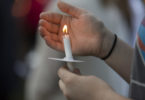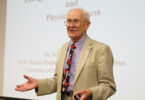The first class of UGA students and employees has completed the university’s Campus Emergency Response Team training program, which prepares non-emergency personnel to respond to emergencies on campus.
“The UGA CERT program trains non-emergency personnel to be able to think and act in a way that helps not only themselves, but also their community and the first-responders during a crisis,” said Steve Harris, director of the Office of Security and Emergency Preparedness, which administered the classes with the Athens-Clarke County Fire Department.
The seven-week program, open free to UGA faculty, staff and students, teaches fundamental disaster response skills and practices. Through weekly 2.5-hour meetings, participants learn about fire safety, disaster medical operations, light search and rescue, disaster psychology, terrorism preparedness and basic first aid.
In addition to learning from professionals, class members receive hands-on training in disaster scenarios.
The next class, which begins Feb. 4, will be held from 3:30-5:30 p.m. in Room 253 of the Miller Learning Center. The deadline to register for the class is Jan. 30. Registration is available online (www.osep.uga.edu/CERT/).
“The program is set up so that emergency workers, such as EMTs, can call on us. We’re not to be the first responders at any time,” said Stephen Rogers, assistant area coordinator for University Housing and program participant.
In addition, the training helps with peace of mind in a crisis, according to Rogers.
“You will come away with an experience that will better prepare you to help your family and others,” he said. “And if your family knows what to do in an emergency, you feel better about leaving them to help out others in the community who may be in need of assistance.”
Graduates of the UGA CERT Program will have the opportunity to participate as volunteers in emergency exercises, special events, drills, advanced training and potential large-scale emergency responses to better prepare the campus and community for disasters.






